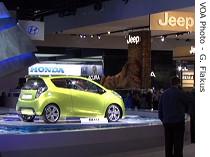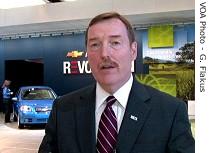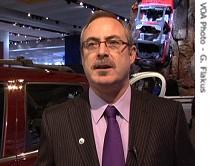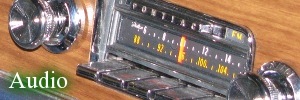|
By accessing or using The Crittenden Automotive Library™/CarsAndRacingStuff.com, you signify your agreement with the Terms of Use on our Legal Information page. Our Privacy Policy is also available there. |

Automakers Show Off Green, Fuel Efficient Vehicles
|
|---|
|
|
Automakers Show Off Green, Fuel Efficient Vehicles
Greg Flakus
Voice of America
January 14, 2008
 Listen to Automakers Show Off Green, Fuel Efficient Vehicles - MP3 - 952KB - 4:03
Listen to Automakers Show Off Green, Fuel Efficient Vehicles - MP3 - 952KB - 4:03

Detroit auto show floor, 14 Jan 2008

Troy Clarke

Paul Eisenstein
|
More than 6,700 reporters from 42 nations are in Detroit for the news media preview of that city's North American International Auto Show, which opens to the general public this weekend. This year's show emphasizes fuel efficiency and green technology, but, as VOA's Greg Flakus reports from Detroit, there are also plenty of big glitzy cars and trucks on display.
On display in Detroit's downtown Cobo Convention Center are 700 vehicles from all the major automakers, including local companies like General Motors, Ford and Chrysler and companies from China, Japan, and Europe. Around 50 new vehicles are being introduced by various manufacturers.
U.S. automakers are making a big effort this year to go green, showing off many varieties of low-emission, fuel efficient vehicles, including hybrids, fuel-cell cars and vehicles that run on ethanol and bio-diesel fuels. General Motors announced that it has invested heavily in Cosaka Incorporated, an Illinois firm that claims to have developed a cost-cutting technology for producing ethanol, an alcohol fuel produced from plant material.
Most ethanol today is produced from corn, but Cosaka plans on using waste material like corn stalks and wood chips.
General Motors North America President Troy Clarke tells VOA that his company sees a need to move away from reliance on gasoline as the only fuel for its cars.
"The next 25 years, maybe even longer, looks a lot like the early part of the (20th) century in the auto industry," Clarke said. "There will be a lot of different propulsion systems. Ninety-six percent of the vehicles in the United States today are moved by gasoline. We need to diversify that."
Clarke says his industry has been wrongly criticized for being slow to innovate. He says General Motors began developing an electric car many years ago and has also developed other kinds of fuel-efficient vehicles.
"Now we have eight hybrids in the market today," he said. "We have 16 on the way between now and, I think, the end of next year, and we can compete very effectively in the hybrid area. But we really have never given up on our vision of an electric vehicle."
General Motors is still testing a new battery to power the Chevrolet Volt, an advanced electric hybrid that was first shown here last year, but which may not be ready for market for a few more years.
Veteran automotive journalist Paul Eisenstein, who writes for TheCarConnection.com, says car makers use the North American International Auto Show to introduce such innovations and get the word out to people around the world.
"This is a place that the manufacturers come, not just to talk to consumers directly, but to talk to global media," Eisenstein said. "This is a place where they can get to everyone from the small bloggers in the Czech Republic to the big networks here in North America. It is no wonder that virtually every manufacturer in the world is here, including five of the Chinese manufacturers that are trying to get into the North American market over the next couple of years."
While automakers are emphasizing fuel efficiency and reduced emissions this year, they are also showing off a lot of big cargo pick up trucks, sport utility vehicles and gas-guzzling luxury cars. Paul Eisenstein says that is simply a response to continuing demand for those vehicles.
"The reality is Americans like big, they like power, they like performance, they like towing and cargo-hauling and people-hauling capabilities," he said. "So for anybody to say we should stop producing these big trucks and go to produce these small, high-mileage (fuel efficient) cars is ridiculous. The market is there for the big vehicles."
Eisenstein says U.S. car makers are trying to satisfy the demand for larger vehicles, while at the same time trying to meet new regulations from Washington that require them to improve fuel efficiency. That could be a real challenge for an industry that is already struggling to keep up with foreign competition.
The North American International Auto Show began in Detroit as a local event in 1907. The event went international 20 years ago, but it is still organized locally by the Detroit Auto Dealers Association. \

















 Topics: North American International Auto Show
Topics: North American International Auto Show
 Listen to Automakers Show Off Green, Fuel Efficient Vehicles - MP3 - 952KB - 4:03
Listen to Automakers Show Off Green, Fuel Efficient Vehicles - MP3 - 952KB - 4:03



